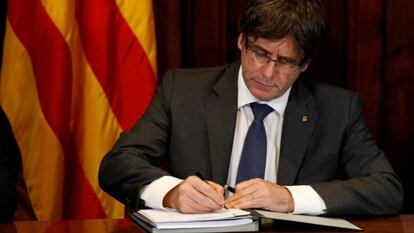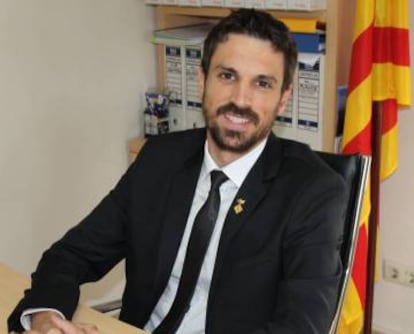Prosecutors take action against Catalan officials after referendum law passed
Constitutional Court also reminds mayors of their duty not to cede public space for October 1 vote

On Friday, state prosecutors in Catalonia moved against regional officials whose actions provided legal coverage for the independence referendum planned for October 1.
Officials in Barcelona are racing to ensure that voters across the region will have somewhere to cast their ballot
Regional premier Carles Puigdemont, his deputy Oriol Junqueras and the 12 members of the Catalan Cabinet are facing charges of disobedience, misusing public funds and making deliberately unlawful decisions as elected officials (known in Spanish as prevaricación).
Parliamentary officials who allowed a referendum law to be put to the vote inside the regional chamber on Wednesday, including Speaker Carme Forcadell, face similar charges in a separate criminal complaint.
Attorney General José Manuel Maza had already announced on Thursday that Spanish institutions would take action against a process that Madrid views as illegal. The Superior Court of Justice of Catalonia must now decide whether it accepts both complaints and investigates the matter.
A reminder to mayors
Meanwhile, Spain’s Constitutional Court is to officially remind the 948 mayors of Catalan cities, towns and villages of their duty to refrain from helping organize the independence referendum that is scheduled for October 1. Anyone who fails to observe this ban could face legal action and even criminal charges.
But the Catalan government has already sent letters urging mayors to cooperate by ceding public space to set up ballot boxes for the poll.
With just three weeks to go before a vote that is pitting the central government of the Popular Party (PP) against Catalonia’s ruling coalition Junts pel Sí, officials in Barcelona are racing to ensure that voters across the region will have somewhere to cast their ballot.

They have even drawn up a list of alternative polling centers, should local authorities refuse to provide assistance. These include high schools, social centers, and even healthcare centers if all other options fail.
So far, 185 mayors have already pledged their support, representing a quarter of the population of Catalonia. Only four municipalities, representing 5.26% of the population, have said they will not cooperate, including the city of Tarragona, with 131,000 residents. The rest, including the city of Barcelona, have yet to take a stand. The Catalan government has given mayors a 48-hour deadline to respond.
Some mayors who were considering a “no” were met with local pressure to switch their reply. In Mataró, around 300 people converged in front of City Hall on Thursday to call on Mayor David Bote, of the Catalan Socialists (PSC), to offer space for the referendum. “We want to vote, we want to vote,” chanted the crowd. No incidents were reported.
Citizens are accusing me of fracturing the social harmony of the village. But the only people to have fractured it are the separatists
Dante López, mayor of Gimenells i Pla de la Font
Earlier, Bote had stated that he would not be loaning out any municipal premises for a poll that the Socialist Party considers illegal. His local party branch said there was a popular campaign to taint the mayor’s good name, and that he should not be blamed for observing national laws.
Other mayors with unfavorable views about the referendum had better luck. On Thursday morning, the locality of Gimenells i Pla de la Font became the first to officially reject the request for help made by regional premier Carles Puigdemont and his deputy, Oriol Junqueras.
“Since I govern with an absolute majority, I did what I felt was the right thing, without even having to consult with the Socialist Party of Catalonia,” said the socialist Dante Pérez.
Even so, Pérez is now facing the wrath of some of the 1,100 residents of this village located near the border with the Spanish region of Aragon.
“Citizens are accusing me of fracturing the social harmony of the village. But the only people to have fractured it are the separatists,” he said. Last year, Pérez hung a Spanish flag on one side of town hall and a Catalan flag on the other, “to show the reality of this village and to include all opinions.” But the Spanish flag disappeared one night. Now he wants to hang both side by side, “to prove that peaceful coexistence is possible.”
English version by Susana Urra.
Tu suscripción se está usando en otro dispositivo
¿Quieres añadir otro usuario a tu suscripción?
Si continúas leyendo en este dispositivo, no se podrá leer en el otro.
FlechaTu suscripción se está usando en otro dispositivo y solo puedes acceder a EL PAÍS desde un dispositivo a la vez.
Si quieres compartir tu cuenta, cambia tu suscripción a la modalidad Premium, así podrás añadir otro usuario. Cada uno accederá con su propia cuenta de email, lo que os permitirá personalizar vuestra experiencia en EL PAÍS.
¿Tienes una suscripción de empresa? Accede aquí para contratar más cuentas.
En el caso de no saber quién está usando tu cuenta, te recomendamos cambiar tu contraseña aquí.
Si decides continuar compartiendo tu cuenta, este mensaje se mostrará en tu dispositivo y en el de la otra persona que está usando tu cuenta de forma indefinida, afectando a tu experiencia de lectura. Puedes consultar aquí los términos y condiciones de la suscripción digital.








































